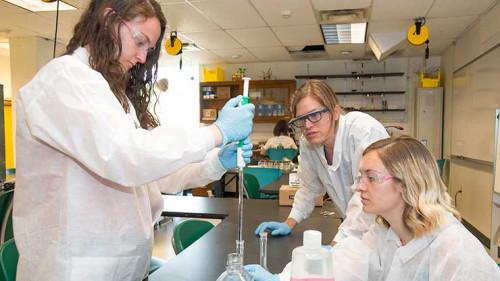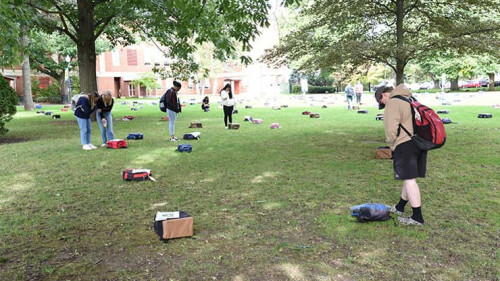
The ceiling lights in the produce section of a grocery store shine directly on the fruits and vegetables, rather than on the aisles, to spotlight the colorful goods for sale. (And BTW, do you know what a “green wall” is?)
Managers should put their most outgoing employees in the floral department, as purchases there are usually 100 percent impulse buys.
“No-No-No red meat” is actually a good thing – it means no preservatives, no antibiotics, no added anything.
Russell Zwanka, Ph.D, assistant professor of marketing, teaches Food Retail Marketing. His students are learning about all levels of the food industry – distribution, wholesaling and retailing. They’re also studying the issues and trends impacting the industry, such as the increase in home cooking, the growth of the food-away-from-home market, the “seismic” shift toward health and wellness, and globalization.
“The goal is to look at food retail in a strategic manner, and this can be applied to any industry,” he explained. “A retailer needs to position categories to reflect the decision-making process and put the customer’s needs first.”
Zwanka recently published his latest book, “A Store Walk,” which takes the reader through the entire grocery shopping experience: pulling into the parking lot, entering the “decompression zone” at the front of the store, shopping in the various food departments, then checking out. Nothing you see or experience on the premises is by accident.
Variables such as layout and pricing, and concepts such as utility deltas and category management are all applied to something every person experiences on a regular, if not daily basis.
“Everyone shops, everyone eats,” he said.
While the course explores different types of food retailing and marketing, Zwanka’s newest book focuses specifically on grocery stores, which he likens to “theater.” He has a passion for the business and the professional experience to back it up: he was a senior vice president for the Golub Corporation, which operates nearly 140 Price Chopper locations in the Northeast. He is also the founder and CEO of Triple Eight Marketing, a consulting provider that helps food and beverage retailers organize their strategy around customer lifestyle and orientation, and previously served as executive vice president at the North West Company, a Canadian food multinational which has operations in 11 time zones.
Siena students will make field trips to local stores this semester to fully immerse themselves in the shopping and marketing experience, because, as Zwanka says “You can’t really teach how a store works unless you get into a store. You need to be able to walk it yourself and see how everything is laid out.”
The class will also conduct a marketing research project for Price Chopper.
Zwanka is looking into developing the class into an entire track of study at Siena.
“Food retail marketing is a very transportable skill,” he explained. “It’s about being on trend, about positioning, about segmentation – you can apply it to any industry.”
Student Sophia Morrell agrees.
“Professor Zwanka is incredibly knowledgeable about the food industry,” she said. “Our class is able to be completely immersed in how food and beverages are marketed, and I have no doubt in my mind that this knowledge will be a valuable commodity once we leave Siena.”
Kathryn Anderson ’19 added:
“The class has completely changed the ways I think about retailing and business models. One of my favorite parts is critically thinking about why businesses make certain decisions, and flushing out all those details and tradeoffs.”

